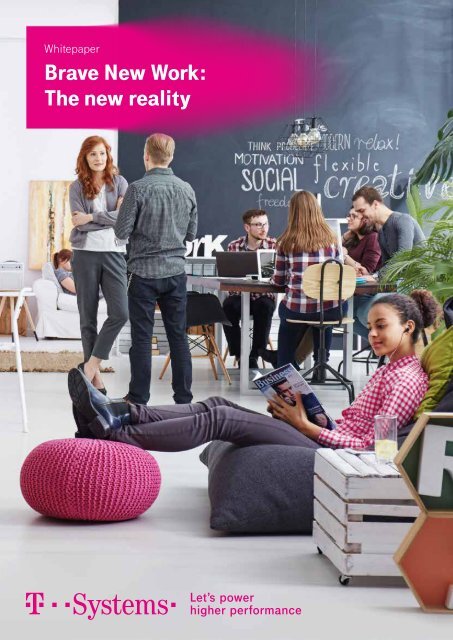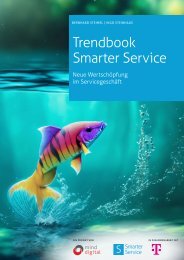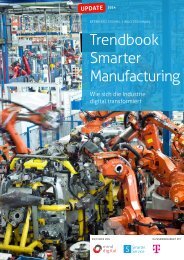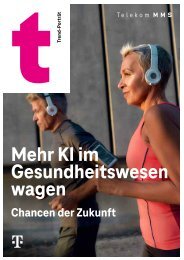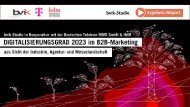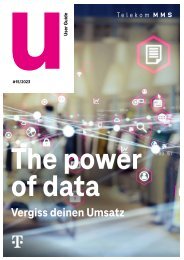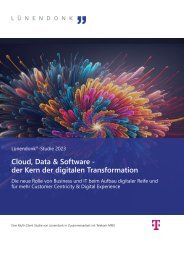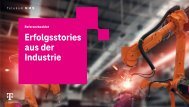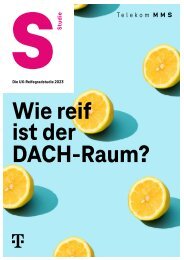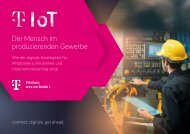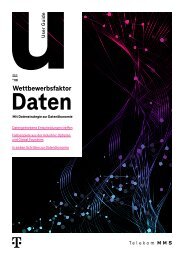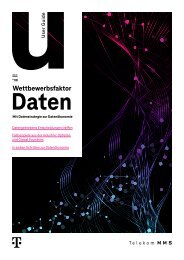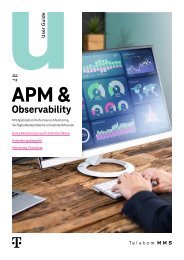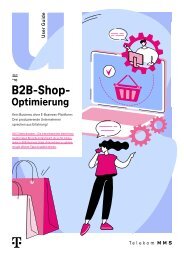0415_WP_Brave-New-Work_EN (1)S.1-9
Create successful ePaper yourself
Turn your PDF publications into a flip-book with our unique Google optimized e-Paper software.
Whitepaper<br />
<strong>Brave</strong> <strong>New</strong> <strong>Work</strong>:<br />
The new reality
Table of contents<br />
Preface 4<br />
<strong>Brave</strong> <strong>New</strong> <strong>Work</strong>: The new reality 6<br />
Facilitators – <strong>New</strong> <strong>Work</strong> 10<br />
Definition <strong>New</strong> <strong>Work</strong> 11<br />
<strong>New</strong> <strong>Work</strong> – Four elements of success 11<br />
First element: Skills & mindset 12<br />
Second element: Devices and tools 16<br />
Third element: Digital processes 21<br />
Fourth element: Reliable Backend-Systems 25<br />
Conclusion 29<br />
Imprint<br />
Whitepaper-Publication March 2020<br />
T-Systems Multimedia Solutions<br />
GmbH Riesaer Straße 5, 01129 Dresden<br />
Authors<br />
Christian Soyez, Carsten Schulze, Johanna Matthes,<br />
Karl-Heinz Bayer, Andreas Kortüm, Christoph Bernhardt,<br />
Thomas Günther, Tino Mager, Markus Wiskirchen,<br />
Thomas Schneider, Christoph Melchior, Jochen Ruoff,<br />
Renata Aichhorner, Maria Koch, Erik Frömder, Ulf-Jost Kossol<br />
Organization<br />
Project lead: Isabel Uhle, Stefanie Herget<br />
Layout: Peter Brücker<br />
Editor: Sven Hansel
Whitepaper — <strong>Brave</strong> <strong>New</strong> <strong>Work</strong><br />
Preface<br />
Preface<br />
Dear readers,<br />
“<strong>Brave</strong> <strong>New</strong> <strong>Work</strong>”– Have you come across the title of our whitepaper?<br />
Good, that means we have already achieved our first thought provoking<br />
impulse.<br />
Because we thoroughly intend to show the small similarity in the name<br />
with the world renowned novel title of Aldous Huxley. We would also<br />
like to highlight the changes, new mindsets and ideas. However what<br />
differentiates us from the dystopia of British authors is that we see<br />
things substantially in a more positive light.<br />
We believe that <strong>Brave</strong> <strong>New</strong> <strong>Work</strong> means obligation and opportunity.<br />
Obligation meaning that the companies are compelled to reassess<br />
their traditional workflows for two key reasons: Firstly, this is made<br />
necessary by the ongoing digitization, and secondly, the employees<br />
are requesting for it. They require flexible workplaces, which are<br />
equipped with modern technology since: “The employer market has<br />
become an employee market”. As appropriately said by Bitkompresident<br />
Achim Berg “There is a lack of skilled personnel in several<br />
professions and across all branches – and not just the best minds<br />
are in great demand”.<br />
However, the opportunity means that with this interpretation of “<strong>Brave</strong><br />
<strong>New</strong> <strong>Work</strong>”, companies get happy employees with a willingness to work,<br />
and above all, fit for the future. They increase the added value and also<br />
remain competitive in the long run.<br />
With the help of this whitepaper, we want to give you the knowhow you<br />
need to successfully introduce <strong>New</strong> <strong>Work</strong> – because one thing is clear:<br />
simply flipping the switch is not useful in this topic. <strong>New</strong> <strong>Work</strong> is always a<br />
combination of theory and practice, of technology and mentality, of digital<br />
processes and holistic backend systems. I cordially invite you to take<br />
a step further while embarking on the journey to the new reality. Read<br />
practical tips, which you can implement realistically in your company, get<br />
acquainted with the most important technologies and learn from numerous<br />
references how <strong>New</strong> <strong>Work</strong> has already proven itself in practice.<br />
Then <strong>Brave</strong> <strong>New</strong> <strong>Work</strong> will no longer remain<br />
a utopia, but will become a promising work<br />
routine.<br />
I hope you enjoy reading this,<br />
Ulrike Volejnik<br />
Head of Business Area <strong>New</strong> <strong>Work</strong><br />
4<br />
5
Whitepaper — <strong>Brave</strong> <strong>New</strong> <strong>Work</strong><br />
<strong>Brave</strong> <strong>New</strong> <strong>Work</strong>: The new reality<br />
<strong>Brave</strong> <strong>New</strong> <strong>Work</strong>: The new reality<br />
A company car, more vacations, and more money – at first glance, these are familiar aspirations<br />
that employees have been typically expressing to their company for decades. And it is<br />
generally believed that it is up to the employers to meet these aspirations. Only exceptional<br />
talents or perhaps the top management saw themselves in a different position, could exude<br />
more confidence and assert these demands more consistently. So much for the stereo type,<br />
however the reality is different today.<br />
Since the age of digitalization has brought in winds of change. Now majority of the qualified<br />
employees – and especially the sought-after young talents – can also make concrete demands<br />
based on four essential grounds.<br />
• Increase in the number of job vacancies can only be explained demographically, and this<br />
has been happening over the years. While the annual average in 2009 was 3,00,641, five<br />
years later the number had already increased to 4,90,310 and now stands at 7,82,327 jobs. 1<br />
This means that employee engagement involves more and more cost every year.<br />
• The situation is even worse in case of highly qualified workers. “It is more than apparent,<br />
that in many areas, we could have had more economic growth if there were enough qualified<br />
professionals available”, said the Minister for Economic Affairs. 2 As a result, the lack of<br />
outstandingly qualified employees is already having a major negative impact on the economy<br />
and putting strain on the business cycle.<br />
• Digitally fit employees enable companies to act in a faster and more flexible manner and to<br />
respond to their customers with their offers (services, products, consulting) in a personalized<br />
manner to ensure long-term economic success. Side effect: Digitization can exponentially<br />
increase the scope for the employees while simultaneously relieving them from routine work.<br />
• Companies not only want, but also need to automate. Going forward, manual processes<br />
would no longer be competitive in some areas. Countries leading in digitization will then be<br />
able to manufacture and offer at even lower prices. Medium-sized mechanical engineering<br />
sectors in particular, will have to rethink their approach and need even more personnel with<br />
technical know-how in their hierarchy, including those sought after by the competition. Technology<br />
is key, both in the company and for the company.<br />
1 https://de.statista.com/statistik/daten/studie/2903/umfrage/jahresdurchschnittswerte-des-bestands-an-offenen-arbeitsstellen/<br />
2 https://www.heise.de/newsticker/meldung/Fachkraeftemangel-Wirtschaft-und-Regierung-wollen-im-Ausland-werben-4616867.html<br />
6<br />
7
Whitepaper — <strong>Brave</strong> <strong>New</strong> <strong>Work</strong><br />
<strong>Brave</strong> <strong>New</strong> <strong>Work</strong>: Die neue Realität<br />
The consequences of this new framework conditions are: A sole employer‘s market is increasingly<br />
becoming an employee‘s market. You are well advised to respond to the wishes and<br />
demands of your employees. Because qualified, contented professionals ensure long-term<br />
competitiveness, secure the survival of a company. More than 50 percent of the companies<br />
perceive the lack of skilled professionals as the greatest threat to their business development. 3<br />
Consequently, this means that organizations have to deal with the requirements of their employees<br />
in detail. This is done in the interest of their own competitiveness.<br />
However, a further challenge is that these demands are formulated explicitly in a different manner<br />
today than in the past and have a completely new nature.<br />
Traditional values such as remuneration, company cars and vacations are being replaced by<br />
others: lifelong learning, security in old age and flexible working. Employees are making higher<br />
and even new demands on the employers.<br />
Three-quarters of the employees expect the company for which they work to offer further training<br />
programs (73 percent) and additional company pension benefits (73 percent). A relaxed<br />
working environment with a sense of community is third on the wish list (71 percent). This is<br />
the result of a representative survey of 1,002 employees in Germany aged between 16 and 65<br />
years, on the behalf of the digital organization Bitkom. 4<br />
However, this combination of concrete demands does not end there: every second employee<br />
values flexible work and expects trust-based working hours (54 percent), working hour accounts<br />
(53 percent), flexitime (51 percent) and home office (49 percent). Approximately, the<br />
same number of employees (48 percent) want a daycare center or another type of childcare for<br />
a better work-life balance, and the study goes on.<br />
Furthermore, companies must not be under any illusions. The market will continue to develop<br />
aligned with the demographics. If you are not the one to meet these demands for qualified<br />
employees, soon there would certainly be another company.<br />
What do professionals associate with <strong>New</strong> <strong>Work</strong> and <strong>Work</strong> 4.0<br />
To what extent do you agree with the following statements?*<br />
Personal aspirations<br />
I would like to be able to divide my working hours freely<br />
It is important for me to pursue a meaningful activity<br />
I would like flat hierarchies<br />
I would like to set my own performance and learning goals<br />
I would like a better work-life balance<br />
<strong>Work</strong> assignments should change regularly<br />
71 %<br />
82 %<br />
96 %<br />
94 %<br />
93 %<br />
90 %<br />
Societal demands<br />
My employer should represent values with which I can identify<br />
My employer should assume social responsibility<br />
It should be normal that even managers work part-time<br />
72 %<br />
96 %<br />
92 %<br />
Consequences of digitization<br />
Artificial intelligence will significantly change my workplace in the future<br />
Digitization of the work space leads to the self-exploitation of people<br />
Digitization of the work space leads to the exploitation of employees<br />
27 %<br />
40 %<br />
37 %<br />
0 % 20 % 40 % 60 % 80 % 100 %<br />
Basis: All surveyed working population (n=1.002) |*Data for » fully agree « and » partially agree «, Source: Bitkom Research<br />
3 https://www.bitkom.org/Presse/Presseinformation/<strong>New</strong>-<strong>Work</strong>-Arbeitnehmer-Chef-erwarten<br />
8<br />
4 https://www.bitkom.org/Presse/Presseinformation/<strong>New</strong>-<strong>Work</strong>-Arbeitnehmer-Chef-erwarten<br />
9


